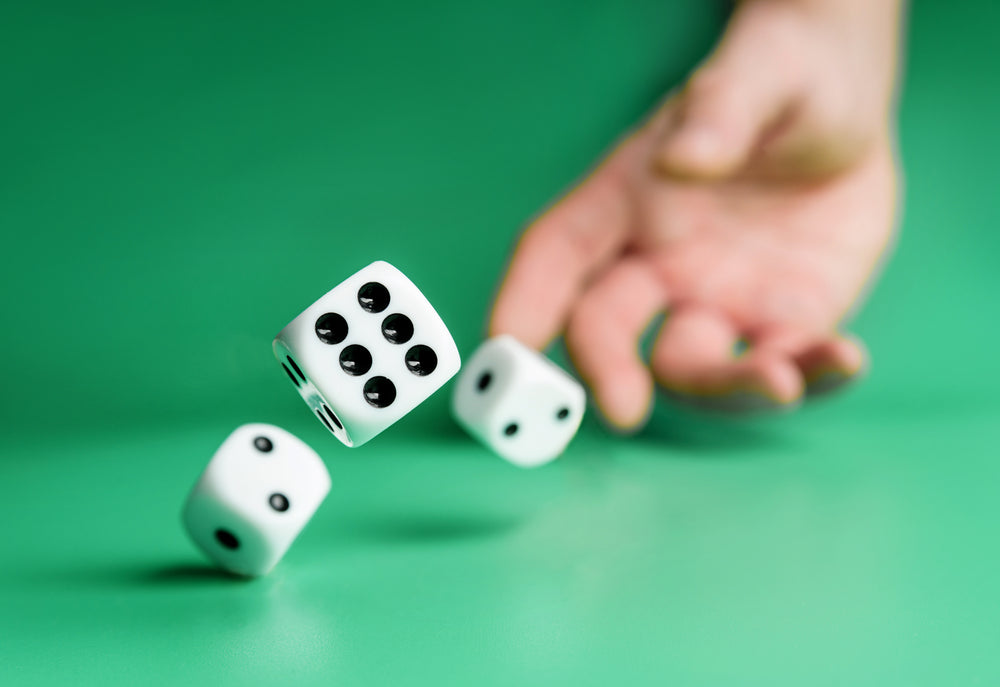Unlocking Poker's Mind Games: Strategies for Mastering Psychology and Cultivating Emotional Control for Enhanced Winning Potential
Are you ready to take your poker game to the next level? Well, buckle up because we've got just the article for you.
Welcome to our in-depth guide on mastering poker psychology, where we will delve into the fascinating world of mind games and emotional control.
Now, you might be thinking, 'Why do I need to understand psychology in poker? Isn't it all about luck?'
Ah, my friend, that's where the irony lies. While luck certainly plays a role, true mastery of this game requires more than just a fortunate hand.
It requires a deep understanding of human behavior and how our minds work under pressure.
In this article, we will explore the intricate art of mind games at the poker game table.
We'll reveal how to read your opponents like an open book and detect those subtle bluffs and tells. But it doesn't stop there.
We'll also teach you how to manage tilt and frustration, develop mental toughness for those grueling long sessions, and maintain unwavering focus and concentration.
So if you're ready to unlock the secrets behind better wins in poker through psychological mastery, let's dive right in!
The Role of Psychology in Poker
Understanding the role of psychology in poker is essential for improving your game and increasing your chances of winning.
Poker goes beyond the cards you hold and how it is shuffled using the ST1000 Card Shuffler.
It involves understanding your opponents' minds and using that knowledge to your advantage.
The mental aspect of the game is crucial. It greatly influences your decision-making process and overall performance at the poker table.
In poker games, players often try to deceive each other through mind games.
Tactics like bluffing, acting weak or strong, and manipulating opponents' emotions are common. Understanding these psychological strategies can give you a significant edge.
Mastering poker psychology allows you to read people better and make more informed decisions based on their behavior and reactions.
Emotional control is vital in poker. It's important to maintain a calm and composed demeanor, regardless of winning streaks or challenging situations.
Emotions like anger, frustration, or fear can cloud judgment and lead to poor decisions.
To excel in poker, you must develop an analytical mindset that combines strategic thinking with an understanding of human behavior.
Embracing the psychological aspect of poker increases your chances of success and mastery of the game.
Understanding Mind Games at the Poker Table
Sitting at the poker table, we engage in a strategic battle of wits and psychological tactics. Understanding mind games is crucial for success in this intense card game.
As players, we must be aware that every move we make sends a message to our opponents.
From our betting patterns to our body language, everything can be analyzed and used against us.
One important aspect of mind games is deception. We can use strategies like bluffing to convince our opponents that we have a stronger hand than we actually do.
By carefully controlling our expressions and actions, we can manipulate their perception and force them into making mistakes.
Another aspect is observation. Paying close attention to how others play their hands can provide valuable insights into their thought processes and decision-making tendencies.
This allows us to exploit their weaknesses and predict their moves.
Furthermore, understanding the psychology behind tilt is essential.
Tilt refers to the emotional state in which a player becomes frustrated or angry due to losing streaks or bad beats.
Recognizing when we are on tilt and learning how to regain emotional control are crucial skills for staying focused and making rational decisions.
In conclusion, mastering mind games at the poker dining table requires analytical thinking, strategic planning, and emotional control.
By employing these techniques effectively, we can gain an edge over our opponents and increase our chances of winning in this thrilling card game.
Remember, it's not just about the poker cards game; it's about outplaying your opponents with psychological finesse.
Emotional Control: Managing Tilt and Frustration
Remaining calm and composed during a losing streak can be challenging, but it's essential for effective tilt management in poker.
When emotions run high, logical decision-making becomes compromised, leading to poor gameplay and unnecessary losses.
Understanding how to manage tilt and frustration is crucial for mastering poker psychology.
To begin with, it's important to recognize the signs of tilt and frustration. These emotions often manifest as anger, impatience, or even desperation.
By being aware of these feelings, we can take proactive steps to regain control over our mindset.
One effective strategy for managing tilt is to take a break from the game when necessary.
Stepping away allows us to reset our emotions and approach the game with a clear mind.
Additionally, practicing deep breathing exercises or engaging in relaxation techniques can help reduce stress levels and promote emotional stability.
Another technique is reframing our perspective on losses. Instead of viewing them as personal failures, we should see them as opportunities for growth and learning.
By adopting this mindset shift, we can detach ourselves emotionally from individual outcomes and focus on making strategic decisions based on long-term success.
Mastering emotional control in poker requires discipline and self-awareness. It's an ongoing process that takes time to develop fully.
By remaining calm during losing streaks and effectively managing tilt and frustration, we position ourselves for better wins by making rational decisions based on sound strategy rather than reacting impulsively out of emotion.
Reading Opponents: Detecting Bluffs and Tells
Pay close attention to your opponents at the poker table, as their subtle gestures and facial expressions can provide valuable clues about whether they are bluffing or holding a strong hand.
Reading opponents is an essential skill that every poker player should aim to master when playing on a BBO poker.
Here are three key factors to consider when trying to detect bluffs and tells:
Body Language
Observe how your opponents carry themselves during the game. Are they fidgeting, avoiding eye contact, or displaying any nervous tics?
These could be signs of a weak hand or an attempt to deceive you.
Bet Sizing
Pay attention to how much your opponents bet in different situations.
A sudden increase in their bets might indicate a strong hand, while hesitant or small bets may reveal weakness.
Timing Tells
Watch for patterns in your opponents' actions and timing during the game. Do they take longer than usual before making certain decisions?
This hesitation could imply uncertainty or a deliberate attempt to mislead you.
By carefully analyzing these aspects, you can gain insights into your opponents' intentions and increase your chances of making accurate reads at the poker table.
Remember, mastering the ability to detect bluffs and tells requires consistent practice and honing of observation skills.
Keep learning, observing, and adapting your strategies based on these valuable cues for better wins at the poker table!
Developing Mental Toughness for Long Sessions
To truly triumph in the treacherous terrain of lengthy poker sessions, one must possess unyielding mental mettle when playing on a Mikhail Darafeev Poker Table.
Developing mental toughness is crucial for maintaining focus and making optimal decisions throughout these grueling sessions.
It requires a combination of self-awareness, emotional control, and strategic thinking.
One key aspect of developing mental toughness is understanding the importance of self-care during long poker sessions.
This means taking breaks when needed, staying hydrated, and getting enough rest beforehand.
By prioritizing our physical well-being, we can ensure that our minds remain sharp and focused for extended periods of play.
Another important element is learning how to manage our emotions effectively.
In the heat of intense competition, it's easy to become frustrated or disheartened by bad beats or losing streaks.
However, maintaining a calm and composed demeanor is essential for making rational decisions and avoiding tilt.
Furthermore, developing mental toughness involves honing our ability to adapt to changing circumstances.
Long poker sessions can be mentally exhausting as they require continuous concentration and decision-making.
By staying flexible in our strategies and adjusting our game plan as necessary, we can better navigate through these marathon sessions.
In conclusion, mastering the art of mental toughness is paramount for success in long poker sessions.
It allows us to maintain focus, make rational decisions under pressure, and adapt to ever-changing dynamics at the table.
By cultivating this unyielding mindset, we position ourselves for better wins in the challenging world of professional poker.
Maintaining Focus and Concentration
Amidst the intense atmosphere of a long poker session, our focus and concentration become as vital as the cards themselves.
Mastering the ability to maintain unwavering attention can make all the difference between winning and losing hand.
Here are four essential strategies to help us stay focused and improve our overall performance:
Set clear goals
Before each session, define specific objectives such as maintaining concentration for a certain number of hands or avoiding distractions during critical moments. This will provide a sense of direction and purpose.
Develop a pre-game routine
Just like professional athletes, we can benefit from establishing rituals that help us enter into a focused mindset before starting each session.
Whether it's deep breathing exercises, visualization techniques, or reviewing hand histories, find what works best for you.
Practice mindfulness
Being fully present in each moment is crucial for optimal performance.
By training ourselves to be aware of our thoughts, emotions, and surroundings without judgment or attachment, we can enhance our ability to concentrate on the game at hand.
Take regular breaks
Sustaining focus over long periods can be mentally exhausting.
Taking short breaks every hour allows us to refresh our minds and return with renewed clarity and concentration.
By implementing these strategies into our poker routine, we can strengthen our focus and concentration skills leading to improved decision-making abilities and ultimately increasing our chances of success at the table.
Utilizing Psychological Strategies for Better Wins
Improve your chances of success at the poker table by utilizing psychological strategies that enhance your decision-making abilities and give us a competitive edge.
Mastering these strategies requires a deep understanding of human behavior and the ability to manipulate it to our advantage.
One effective psychological strategy is bluffing. By intentionally misrepresenting our hands, we can deceive opponents and make them fold when they have stronger cards.
However, bluffing requires careful consideration of our opponents' personalities and tendencies.
We must gauge their level of risk aversion and adapt our tactics accordingly.
Another strategy is psychological manipulation.
This involves using subtle cues and gestures to influence our opponents' decisions.
For example, maintaining a calm demeanor can lead others to perceive us as confident and in control, causing them to doubt their own abilities.
Furthermore, mastering emotional control is crucial for success in poker.
Keeping emotions in check allows us to make rational decisions even under pressure or when faced with setbacks.
Learning techniques such as deep breathing or visualization can help us stay focused and maintain composure throughout the game.
In conclusion, by employing psychological strategies such as bluffing, manipulation, and emotional control, we can improve our chances of winning at the poker table. Understanding human behavior and utilizing these tactics strategically will give us a significant advantage over our opponents.
Frequently Asked Questions
What are the basic rules and strategies of poker?
To excel at poker, we must grasp the basic rules and employ effective strategies. We'll delve into key concepts like hand rankings, betting tactics, and reading opponents. Get ready to conquer the poker table!
How do I calculate odds and probabilities in poker?
To calculate odds and probabilities in poker, we analyze the number of outs, or cards that can improve our hand. By dividing the number of outs by the remaining unknown cards, we can determine our chances of winning.
What are the different types of poker games available?
There are various types of poker games available, including Texas Hold'em, Omaha, and Seven-Card Stud.
Each game has its own set of rules and strategies, making it important to understand the nuances of each one for successful mastery. when playing on a Ram Game Room Poker Table.
How do I choose the right starting hands in poker?
To choose the right starting hands in poker, we analyze factors like position, stack sizes, and opponents' tendencies.
We prioritize strong hands like pocket pairs and suited connectors while avoiding weak hands with little potential for improvement.
What are some common mistakes to avoid in poker?
Some common mistakes to avoid in poker include playing too many hands, failing to manage your bankroll properly, and letting emotions cloud your judgment.
These errors can lead to costly losses and hinder your overall success in the game.
Conclusion
In conclusion, mastering poker psychology is essential for achieving better wins in the game.
By understanding mind games and emotional control, players can navigate through the complexities of the poker table with ease.
The ability to read opponents and detect bluffs becomes a powerful tool in one's arsenal.
Developing mental toughness and maintaining focus are crucial for long sessions while utilizing psychological strategies adds an extra edge to one's gameplay.
So, remember, when it comes to poker, it's not just about the cards you hold but also the mind games you play.





